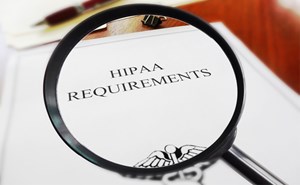As discussed in a recent Regs & Eggs blog, new requirements around data sharing and “information-blocking” went into effect on April 5. These new rules, which were mandated by the 21st Century Cures Act, require that patient notes, lab results, and other information be shared with patients—with some limited exceptions.
The Office of the National Coordinator (ONC) for Health Information Technology within the U.S. Department of Health and Human Services (HHS) issued a regulation implementing these requirements last year—and while ONC includes detailed policies and procedures about what data must be shared, health care systems (like hospitals) do have some discretion in terms of how to operationalize the requirements. ACEP has tried to be proactive to help you as emergency physicians understand the requirements and to assess whether any regulatory changes are necessary. On March 25, ACEP met with ONC leadership, including the Chief Medical Officer, to discuss specific health information technology issues, including the implementation of these requirements. As part of the conversation, ONC asked for specific feedback on how the requirements would impact emergency physicians. To respond to ONC’s request, ACEP created a poll for emergency physicians to gather our member’s overall input on the data sharing requirements.
Well, the results of the poll are in (we received 134 responses), and they clearly indicate that there is room for improvement in terms of the requirements themselves and how hospitals have implemented them. With respect to the requirements themselves, although respondents generally supported sharing data with patients, the biggest issue flagged repeatedly in the poll was around the timing of the data sharing. Specifically, there appear to be significant unintended consequences associated with sharing notes and lab results immediately—before emergency physicians are able to discuss the results with their patients. Over two-thirds of respondents in the poll stated that lab results are shared immediately with patients once they are available (also interestingly, over 20 percent didn’t know when the results are shared with patients). According to these respondents, this policy of sharing notes immediately has caused patient confusion, anger, and sadness—with some extremely compelling examples, including patients who have found out they had cancer or a miscarriage without first being able to discuss their diagnosis with a physician. Further, there are numerous examples of patients misreading or misinterpreting clinical notes and lab results, causing physicians to have to spend significant time correcting those misconceptions and consoling patients.
While there are a total of eight exceptions to data sharing, nearly all respondents (over 90 percent) stated that they have only claimed the exception related to physical harm. This exception, which allows physicians to opt out of data sharing in cases where the sharing of data could physically harm patients, does not extend to emotional harm. Nearly 30 percent of respondents stated that they were forced to share data with patients even when they knew that the data would cause emotional harm or distress to the patient.
In addition, over three-quarters of respondents are concerned about liability (i.e., getting sued) when they share notes with patients. Added to that is a fear of the consequences of not sharing data. While HHS has not yet instituted penalties to providers for not complying with the requirements, respondents, unsurprisingly, overwhelming opposed the idea of penalizing emergency physicians who block digital note-sharing with good reason.
Although documentation burden has been a constant issue for years, over 60 percent of respondents believed that these requirements have already or will cause them to spend more time on documentation. Roughly the same percentage of respondents also said that they have changed their documentation habits—including avoiding language that could potentially upset or confuse patients. Some respondents said that their notes are shorter, but it takes longer to write them.
As mentioned earlier, hospitals have taken various different approaches implementing the requirements—and it seems like some have done better than others in that regard. For example, only half of respondents stated that they were provided specific education in their institution or department on the requirements. Further, roughly one-third of respondents were not familiar with the allowable exceptions to data sharing and over one-third didn’t even know how to claim one! Finally, if patients view the note and request changes to their record, the majority of respondents didn’t know how or when their hospital communicated that request back to them.
All in all, based on these results, there are definitely areas of concern about the implementation of the requirements on which ACEP hopes to engage with ONC—especially the consequences of prematurely sharing data with patients. Another issue, not specifically captured in the poll, is that most emergency physicians don’t have preestablished relationships with patients—so that adds another layer of potential confusion and adverse consequences when patients receive information right away (even before they are discharged from the emergency department). Beyond any regulatory changes that ACEP may want to pursue, it also is clear that many hospitals and departments need to do a better job helping physicians understand how they can exclaim an exception and how and when notes and other clinical information are shared with patients.
Until next week, this is Jeffrey saying, enjoy reading regs with your eggs.






